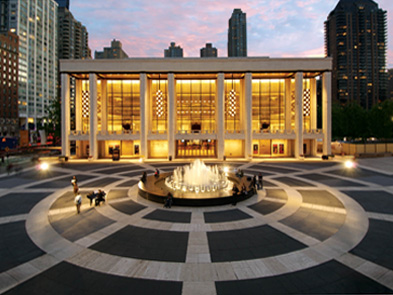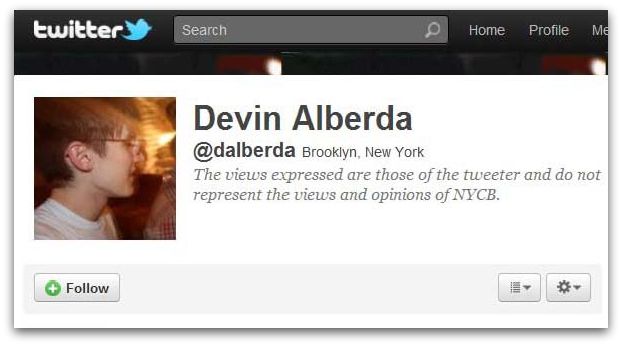 Remember that saying, “If you don’t have anything nice to say, don’t say anything at all.” Turns out your mom was right, especially when it comes to social media.
Remember that saying, “If you don’t have anything nice to say, don’t say anything at all.” Turns out your mom was right, especially when it comes to social media.
Common sense, right? Well, apparently some of us need to be reminded.
Devin Alberda, one the New York City Ballet’s corps de ballet, learned firsthand how damaging opening his big fat social media mouth could be.
 When Devin’s boss at the NYCB was busted for drunk driving, he posted the oh so support tweet: ‘Thank goodness riding the subway while intoxicated isn’t a misdemeanour offence.” Funny? Yes. Smart? Not so much.
When Devin’s boss at the NYCB was busted for drunk driving, he posted the oh so support tweet: ‘Thank goodness riding the subway while intoxicated isn’t a misdemeanour offence.” Funny? Yes. Smart? Not so much.
When you include the hashtag #dontfireme, you know that you have taken the joke too far.
Devin became quite the repeat offender when he continuously tweeted unflattering comments about the NYCB’s No. 1 donor, David Koch. FYI – the NYCB performs at the The Koch Theater and Koch may or may not have donated $100 million to the ballet company. No big deal.
Devin’s tweets have also called out the NYCB for racial stereotyping and has made mentions of a conspiracy theory with Koch and the Tea Party.
The NYCB didn’t sit back and take it.
NYCB has set the precedent for all other performing-arts companies by forcing company members to sign a contract that allows the company to monitor the dancers’ social media presence. Devin’s tweets has also inspired the ballet company to force the dancers to include a disclaimer in Twitter bios, stating that their views do not represent the NYCB (see Devin’s bio below). Additionally, the contract bans dancers from taking pictures of other company members without the NYCB’s permission.
 I’ll give it to them that Devin may have taken it a step too far but two wrongs don’t make a right. This new policy is a little over the top, in my opinion. Monitoring your employees’ online commentary is justified but the ban on taking pictures of other company members without the NYCB’s permission is ridiculous.
I’ll give it to them that Devin may have taken it a step too far but two wrongs don’t make a right. This new policy is a little over the top, in my opinion. Monitoring your employees’ online commentary is justified but the ban on taking pictures of other company members without the NYCB’s permission is ridiculous.
The ballet’s executive director, Katherine Brown, has come out in defense of the company. In a recent statement Brown said:
“In order to protect its interests, NYCB reserves the right to monitor postings that are available to the general public or those that are not privacy-protected about the company, its employees and its activities.
Because social media usage has dramatically increased and will continue to do so, like many organizations the company is exploring the development of social media guidelines for all artistic and administrative employees with respect to their professional lives.”
Did anyone else stop listening at “in order to protect its interests” – I did.
It will be interesting what other performing-arts companies follow in the footsteps of the NYCB. Only time will tell.
To read more on this social media fail, check out recent articles in Ragan’s PR Daily and Daily Mail.




Does the company receive money of benefits from photos of the dancers in the company? If so, I could understand the thought behind the company’s new policy. If the company is receiving monetary benefits from photos that the company is putting forth they probably do not want the people that are paying for those photos to just go to some dancers social media page and grab the photos the dancers are publishing (with permission of course because that would be plagiarism). I almost agree with their decision. Devin made the company look bad, and possibly lose clients and millions of dollars of endorsements.
The NYCB new policies are understandable because they are trying to avoid more employees speaking out against the company. Taking away the members right to take pictures without consent by the company is taking it a bit too far. Unless they feel like they could potentially loose money and customers from the picture that is being taken. The comments that were made by Devin about about racial stereotyping and about tea party affiliation could potentially hurt the companies relationship with some customers.
I think that, like you said, social media requires theresposibility of its users. But sometimes I believe that it is alright for companies to monitor what their employees say and how they conduct themselves in such a public eye. It sounds like you don’t think that companies have the right to require disclaimers or monitor social media. However, if one can’t monitor themselves, somebody has to.
https://igbochat.com/macallacar billypans jaemun de8b5d4261
https://member.fxbangladesh.com/gravitamyc uniqdenz eberhardt 4b1f4b8a67